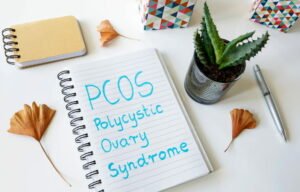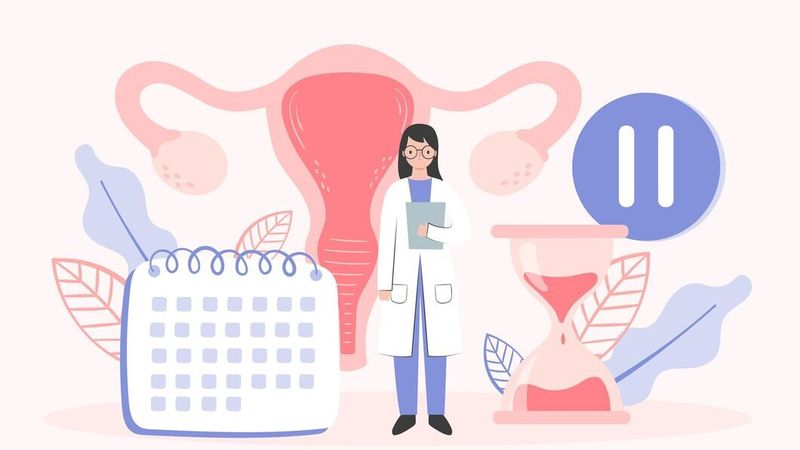Polycystic Ovary Syndrome, commonly known as PCOS, is a prevalent hormonal disorder affecting individuals assigned to females at birth. This complex condition disrupts the ovaries’ normal functioning, leading to many symptoms that can significantly impact both physical and emotional well-being. From irregular menstrual cycles to fertility challenges, PCOS demands attention and understanding. In this comprehensive guide, we will explore the diverse PCOS symptoms and treatment options.
Contents
What is PCOS?

Polycystic Ovary Syndrome (PCOS) is a common hormonal disorder that affects people with ovaries. It is characterized by an imbalance in reproductive hormones, leading to a variety of symptoms and potential health issues. The term “polycystic” refers to the presence of small cysts on the ovaries, which may not be actual cysts but rather follicles containing eggs that have not matured.
The exact cause of PCOS is not fully understood, but a combination of genetic and environmental factors is believed to contribute to its development. Insulin resistance, where the body’s cells do not respond effectively to insulin, is also a common feature of PCOS. This can lead to increased levels of insulin in the blood, which may stimulate the ovaries to produce more androgens (male hormones) than usual.
PCOS Symptoms
Polycystic Ovary Syndrome (PCOS) manifests through a diverse range of symptoms, and it’s important to note that not every individual with PCOS will experience the same set of symptoms. The severity of symptoms can also vary. Here are the key symptoms associated with PCOS:
- Irregular Menstrual Cycles: One of the most common symptoms of PCOS is irregular periods. Women with PCOS often experience irregular, infrequent, or prolonged menstrual cycles, making it challenging to predict ovulation.
- Hyperandrogenism: Elevated levels of androgens, commonly known as male hormones, can lead to symptoms such as:
- Acne: Increased androgen levels can contribute to the development of acne on the face, chest, or back.
- Hirsutism: Excessive hair growth, particularly in areas where men typically grow hair, such as the face, chest, and back.
- Male-pattern baldness: Thinning of hair on the scalp, similar to the pattern observed in men.
- Ovulatory Dysfunction: PCOS often disrupts the normal ovulation process, impacting fertility. Women with PCOS may experience difficulty getting pregnant due to irregular or absent ovulation.
- Insulin Resistance: Many individuals with PCOS have insulin resistance, where the body’s cells do not respond effectively to insulin. This can lead to elevated insulin levels in the blood, contributing to weight gain and an increased risk of type 2 diabetes.
- Weight Gain: PCOS results in weight gain, particularly around the abdominal area. Insulin resistance and hormonal imbalances can contribute to difficulty in maintaining a healthy weight.
- Skin Changes: In addition to acne, women with PCOS may experience changes in skin pigmentation, such as dark patches or skin tags, particularly in areas with friction.
- Mood Changes: Hormonal fluctuations associated with PCOS can contribute to mood swings, anxiety, or depression in some individuals.
- Sleep Disturbances: Sleep apnea and other sleep disturbances may be more prevalent in women with PCOS, possibly due to the association with obesity and insulin resistance.
It’s important to recognize that the symptoms of PCOS can impact various aspects of a person’s health and well-being.
Causes of PCOS

The exact causes of Polycystic Ovary Syndrome (PCOS) are not fully understood, and the condition is likely influenced by a combination of genetic, hormonal, and environmental factors. Researchers continue to investigate the complex interplay of these factors in the development of PCOS. Here are some key contributors that are believed to play a role:
- Genetics: There is evidence to suggest a genetic component to PCOS. Women with a family history of PCOS are more likely to develop the condition. Certain gene variants may predispose individuals to PCOS, although the specific genes involved are still being studied.
- Hormonal Imbalances: PCOS is characterized by an imbalance in sex hormones, particularly elevated levels of androgens (male hormones) and luteinizing hormone (LH), and lower levels of follicle-stimulating hormone (FSH). This hormonal imbalance can disrupt normal ovarian function, leading to the characteristic symptoms of PCOS.
- Insulin Resistance: Insulin is a hormone that helps regulate blood sugar levels. Insulin resistance occurs when the body’s cells don’t respond properly to insulin, leading to higher levels of insulin in the bloodstream. Elevated insulin levels may stimulate the ovaries to produce more androgens, contributing to the hormonal imbalances seen in PCOS.
- Inflammation: Chronic low-grade inflammation may play a role in the development of PCOS. Inflammation is associated with insulin resistance and can contribute to the disruption of normal ovarian function.
- Environmental Factors: Certain environmental factors may contribute to the development or exacerbation of PCOS. These factors include exposure to endocrine-disrupting chemicals (EDCs) and lifestyle factors such as diet and physical activity. High levels of stress may also influence hormone levels and contribute to PCOS symptoms.
- Obesity: While not a direct cause, obesity is often associated with PCOS. Excess body weight, especially abdominal fat, can contribute to insulin resistance and exacerbate hormonal imbalances, further complicating the symptoms of PCOS.
It’s important to note that the causes of PCOS are likely multifactorial, and the combination of these factors can vary among individuals. Additionally, PCOS can present differently in different individuals, with some experiencing more pronounced symptoms than others.
PCOS Treatment- Coping up with PCOS
Managing Polycystic Ovary Syndrome (PCOS) involves a multifaceted approach that addresses its diverse symptoms and underlying hormonal imbalances. Treatment strategies aim to alleviate symptoms, regulate menstrual cycles, improve fertility, and reduce the risk of associated health complications. Here’s a comprehensive overview of PCOS treatment options:
Lifestyle Modifications
Lifestyle modifications can play a crucial role in managing PCOS symptoms and improving overall health. It’s important to note that these suggestions should be discussed with a healthcare professional, as they can provide personalized advice based on individual health needs. Here are some general lifestyle modifications that may help manage PCOS:
Healthy Diet:
- Balanced Nutrition: Focus on a well-balanced diet that includes a variety of fruits, vegetables, whole grains, lean proteins, and healthy fats.
- Low-Glycemic Foods: Choose low-glycemic index foods to help stabilize blood sugar levels. This includes whole grains, legumes, and non-starchy vegetables.
- Limit Processed Foods: Minimize the intake of processed and sugary foods, as they can contribute to insulin resistance.
Regular Exercise:
- Engage in regular physical activity, such as aerobic exercises (walking, jogging, cycling) and strength training. Furthermore, exercise can help improve insulin sensitivity and regulate hormones.
Weight Management:
- Achieving and maintaining a healthy weight can be beneficial for managing PCOS symptoms. Even a modest weight loss of 5-10% of body weight can have positive effects.
Medications

In addition to lifestyle modifications, healthcare professionals may recommend medications to manage specific symptoms associated with Polycystic Ovary Syndrome (PCOS). The choice of medication depends on the individual’s symptoms, health status, and reproductive goals. Here are some commonly prescribed medications for PCOS:
- Birth Control Pills: Oral contraceptives are often prescribed to regulate menstrual cycles and reduce androgen levels. They can also help manage symptoms such as acne and excessive hair growth.
- Anti-Androgen Medications: Medications like spironolactone may be prescribed to reduce the effects of elevated androgens, addressing symptoms like acne and hirsutism (excessive hair growth).
- Metformin: Metformin is a medication commonly used to treat type 2 diabetes, but it is also prescribed for PCOS. It helps improve insulin sensitivity, reducing insulin resistance and lowering androgen levels. This can be particularly beneficial for individuals with PCOS who are insulin-resistant.
- Fertility Medications: For individuals trying to conceive, fertility medications such as clomiphene citrate or letrozole may be prescribed to stimulate ovulation.
- Gonadotropins: In some cases, gonadotropin injections may be used to stimulate ovulation, especially when other fertility medications are not effective.
Fertility Treatments
Fertility treatments for individuals with Polycystic Ovary Syndrome (PCOS) aim to address ovulatory dysfunction and improve the chances of conception. The specific treatment approach depends on individual factors such as the severity of PCOS symptoms, age, overall health, and reproductive goals. Here are some common fertility treatments for individuals with PCOS:
- Ovulation Induction with Clomiphene Citrate or Letrozole: Clomiphene citrate and letrozole are commonly prescribed medications to induce ovulation. They are usually the first line of treatment for women with PCOS who are trying to conceive. These medications stimulate the ovaries to produce eggs.
- In Vitro Fertilization (IVF): IVF is an assisted reproductive technology that involves fertilizing an egg with sperm outside the body and then implanting the embryo into the uterus. IVF may be recommended if other treatments are unsuccessful, or if there are additional fertility challenges.
Management of Specific PCOS Symptoms

Polycystic Ovary Syndrome (PCOS) can present with a variety of symptoms, and management strategies often target specific symptoms to improve overall health and well-being. Here are some common PCOS symptoms and corresponding management approaches:
Irregular Menstrual Cycles:
- Maintain a healthy weight through diet and exercise.
- Birth control pills or hormone therapy to regulate menstrual cycles.
- Metformin may be prescribed to improve insulin sensitivity.
Insulin Resistance:
- Follow a low-glycemic-index diet rich in whole grains, fruits, and vegetables.
- Regular exercise to improve insulin sensitivity.
- Medications like metformin to manage insulin levels.
Weight Management:
- Adopt a balanced and sustainable diet.
- Furthermore, engage in regular physical activity, combining both aerobic and strength training exercises.
- Consider working with a nutritionist or a fitness professional for personalized guidance.
Hyperandrogenism (Elevated Androgen Levels):
- Birth control pills can regulate androgen levels and manage symptoms like acne and hirsutism.
- Anti-androgen medications such as spironolactone may be prescribed.
- Topical treatments for acne and laser therapy for excess hair.
Acne and Skin Issues:
- Establish a consistent skincare routine.
- Topical treatments containing benzoyl peroxide or salicylic acid for acne.
- Consult a dermatologist for more severe cases or persistent issues.
Conclusion
In conclusion, the management of specific PCOS symptoms involves a multifaceted approach aimed at addressing the varied manifestations of this condition. From regulating menstrual cycles and managing insulin resistance to addressing the cosmetic and emotional aspects, a comprehensive strategy is essential.
Adopting a healthy lifestyle, including a balanced diet and regular exercise, forms the foundation. Medications, such as hormonal therapies and anti-androgens, play a crucial role in symptom control.
If you are facing PCOS-related issues, PCOS treatment at HerMantra can help. Book your free trial online Pcos treatment session now.


